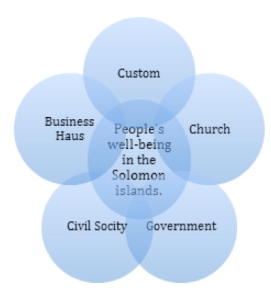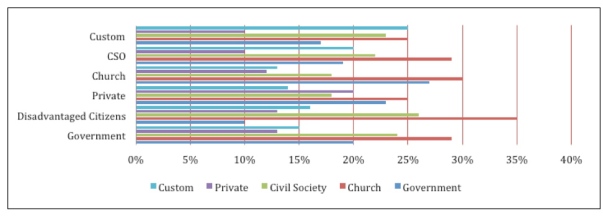This article follows the article Mapping the Means to Citizen Action. To understand citizen voice and action we asked a variety of questions. Our core inquiry was around: Which authority bearers give the most support to people’s well-being? Who do people in the community go to when they face issues they can’t solve? Which institutions provide what support? The following tool describes one-piece of a larger project that looked at citizen voice and action.
Deciding whom are the ‘authority bearers’. We did not use the common idea of ‘duty bearers’ for this project because –if misused– it dis-empowers. It can imply only the government has the duty to ensure the rights of people. In practice several groups feel a duty and –more importantly– have authority. Putting one group –the government– as the only one with the duty removes responsibility from other actors. This is dangerous in cultures with strong traditional leadership. In these societies current governance models are young vs. traditional systems.
We used various pieces of literature and organizational experience to choose the following categories for people that have authority in the community.
1) Business Haus (private sector)
2) Government
3) Church (religious sector)
4) Civil Society (civil society organizations)
5) Customary Leadership
Setting the design. We designed the participant guide to give us rich data. We chose participant categories that allowed us to compare stories to show likeness and difference. The participants were from government, businesses, religious sector, civil society, customary leadership and people socially disadvantaged (age, PWD’s, and women). The diversity of participants gave us the capacity to compare perspectives.
We designed interviews for each participant group. The interviews had enough likeness to cross-check and enough difference to be specific for the group we were talking with.
Ranking Authority. We started with explaining whom we had chosen as authority bearers and why we had chosen them. We showed the below image to participants. They used ten paper clips and ranked which authority bearer has more impact on people’s well-being. Follow-up description or questions provided ideal clarification for the idea of “well-being”. Questions such as, “for example when people have a problem in the community that they can’t solve who do they go to?”
Hearing the Stories. To clarify, confirm, and build the data we asked questions around how authority bearers supported or did not support people’s well-being. We used our pre-designed interviews which were specific for participant groups. Since the research had a special focus on civil society we also looked at how various authority bearers partnered or did not partner with civil society.
Bringing experience into the data. The narratives were tracked and set apart by population. The stories became the meat of the research. These narrative showed the perspective from various groups about which authority bearer were actively supporting people’s well-being. Stories became tipping points and a theory of change through use of grounded theory.
How to use the data. The ranking gave another lens of the perspective of the people we interviewed. Here is a sample (fictitious) of how to report the ranking data.
Combining stories and numbers. In the analysis we were able to use the extensive qualitative data (stories) in combination with the numeric data. Places of congruence and difference proved ideal for discovering what had previously been unseen. This data was then discussed with another group of participants -grass-roots experts – to do a “member check”. These participants were key in interpreting points that had previously been confusing.
About the Author: Dr Matthew S. Will has over a decade of experience in International Development working and living in South East Asia and the Pacific. If you would like to talk to him about innovative ways for a partnering towards a flourishing society click here. Other method articles found on the flourishing and disadvantage web-site by Dr. Will are Mapping the Means to Citizen Action, THE MODEL FLOURISHING and Theories of Change: Grounded for Complex Environments. It is also important to mention that although Dr. Will designed the original research tool the use -as described here- was honed and changed with Julia Fationo. Without Julia’s expertise in interviewing to hear peoples stories the tool would be quite different. It would be less grounded and effective.
Note: The above data is an example to describe a tool. The data itself is fictitious. The tool however has was tested and proved powerful.



[…] society click here. Other articles he has written that relate to community action are: Who has the Authority for Mapping Well-Being? Mapping Citizen Action and Mapping the Means to Citizen Action. Other method articles found on the […]
LikeLike
[…] disadvantage web-site by Dr. Will are Mapping the Means to Citizen Action, THE MODEL FLOURISHING, Who has Authority for People’s Well-Being? Mapping Citizen Action, Change: Community Action and the Theory U and Theories of Change: Grounded for Complex […]
LikeLike